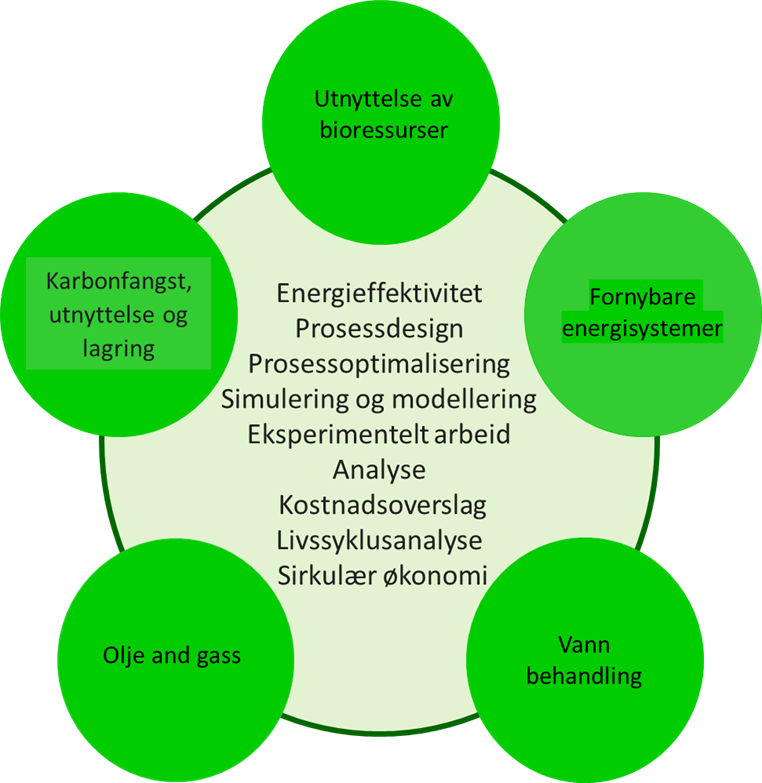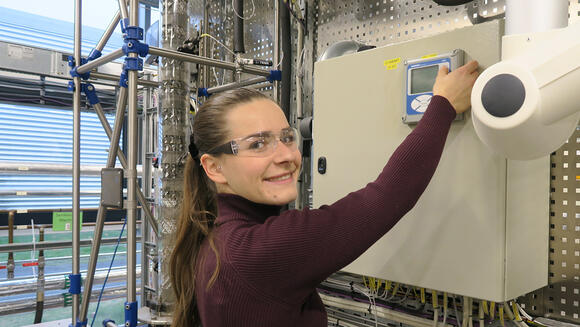For å møte denne utfordringen, fokusere vi på flere nøkkelområder:
- Verdiskapning fra avfall og optimal utnyttelse av avfallsmaterialer og sidestrømmer: Implementere effektive prosesser og optimalisere energisystemene for å realisere verdiskapning fra avfall.
- Redusere miljøpåvirkningen fra fossile ressurser: Evaluere strategier for å minimere den negative påvirkningen av leting etter og utnyttelse av fossile brensler, samt legge til rette for økt bruk av fornybare energikilder.
- Karbonfangst, utnyttelse og lagring (CCUS): Utvikle teknologier for å fange og lagre CO2-utslipp fra industrielle prosesser, samt utvikle prosesser for å utnytte CO2 som ressurs.
- Utvikling av ressursgjenvinningsteknologi og karbonnøytral fornybar energi: Utvikle teknologier for å gjenvinne materialer fra avfall og sidestrømmer, og produsere ren fornybar energi.
- Tiltak for bedre vannkvalitet og miljøsikring: Evaluere strategier for god vannkvalitet, trygge vannressurser, og håndtering av overflatevann.
- Livssyklusanalyse og økonomisk vurdering av produkter og prosesser: Vurdere miljøeffekter i et livssyklusperspektiv, samt vurdere kostnadseffektiviteten og bærekraften til ulike produkter eller prosesser.
Vi har som mål å gi betydelige bidrag til innovative løsninger for å løse klimautfordringene. Vi jobber med å utvikle robuste energimatriser og redusere miljøpåvirkningen fra energi- og prosessystemer. Vår forskning er alltid vurdert i perspektiv av en sirkulær økonomi, for optimal utnyttelse av våre begrensede ressurser. Vi samarbeider tett med industrien for å bidra til å redusere klimagassutslippene og fremme en bærekraftig energifremtid.
Forskningsområder

Effektiv overgang til et lavkarbonsamfunn krever kunnskap om fornybar energi og CO2-fangst, samt prosessene som i dag brukes i energisektoren. Slik kunnskap er integrert i forskningsgruppen URGENT ved å kombinere innsatsen fra følgende områder hvor vi har godt etablert forskning:
Karbonfangst, utnyttelse og lagring
Konsekvensene av økende CO2-konsentrasjonen i atmosfæren og global oppvarming blir stadig tydeligere, og det er nødvendig med sterke avbøtende tiltak.
Blant alternativene for fjerning av CO2 fra forbrenningsgasser, er aminbasert kjemisk absorpsjon den mest utviklede metoden. Det er også den metoden som dominerer det aktuelle forskningsfeltet. Forskergruppen har bred kompetanse innen post-combustion CO2-fangst ved bruk av aminbaserte løsemidler. Vi er eksperter på prosessoptimalisering, prosesssimulering og kostnadsestimering av karbonfangstanlegg. Hos USN har vi også utviklet et laboratorieanlegg for CO2-fangst. Nedbrytning av amin fra denne typen anlegg kan bidra til utfordrende miljøpåvirkninger som må håndteres, og løsningsmiddelhåndtering er et av våre forskningstemaer.
Vi har et nært samarbeid med industrien og har bidratt i utviklingen av CO2-fangstanlegget ved Heidelberg Materials, Brevik.
Det er verdt å merke seg at CO2 som fanges fra utslippskilder har en negativ verdi siden produsenten må betale for transport og lagring. Derfor kan CO2 bli en rimelig råvare som kan brukes i produksjon av verdifulle produkter. Blant metodene som utforskes for å utnytte fanget CO2 er esterdannelse.
Elektrifisering av næringen er av sentral betydning i overgangen fra fossil til grønn industri. For høytemperaturprosesser, som sementproduksjon, er dette utfordrende. Men å erstatte drivstoff forbrenning med elektrisk kraft gir noen nye muligheter i form av integrert CO2-fangst. URGENT har i flere år jobbet med elektrifisering av sementkalsinere kombinert med CO2-fangst. Dette kan redusere CO2-utslippene fra sementanlegg med mer enn 70 %, og ved hybridløsninger vil nær 100 % fangst sannsynligvis være mulig.
Utnyttelse av bioressurser
Biomasse kan omdannes til nye og nyttige produkter eller utnyttes til energiformål – eller begge deler. Næringsstoffer som nitrogen og fosfor kan resirkuleres. Bærekraftig utnyttelse av bioressurser er et viktig bidrag til den sirkulære økonomien og er en nøkkelfaktor for å nå de europeiske klimamålene i 2030. Biomasse kan være organisk matavfall, restavfall fra skog- og landbruksindustrien, sidestrømmer fra prosessindustrien, kommunalt avløpsvann eller husdyrgjødsel.
For å redusere klimaavtrykket er det nødvendig å erstatte fossilt karbon med «grønt» karbon fra de fornybare kildene gjennom fotosyntesen. Det er derfor viktig å ha kunnskap om ulike typer biomasser, prosessforhold under håndtering, samt gode kombinasjonsmuligheter under prosessering. Dette vil gi best mulig utnyttelse av biomassen og størst nytte i form av utslippsreduksjoner og verdiskaping.
Organiske avfallstyper, som industriavfallsfraksjoner eller blandede avfallsfraksjoner som gjenstår etter sortering av kommunalt fast avfall, kan ha betydelig oppvarmingsverdi og har et relativt lavt innhold av fossilt karbon. Erstatning av kull eller annet fossilt brensel med fast gjenvunnet brensel (SRF) eller refuse-derived drivstoff (RDF) kan således redusere netto CO2-utslipp fra industrianlegg som tradisjonelt bruker fossilt brensel. I tillegg kan restbiomasse og avfall brukes i anaerob nedbryting og/eller gassifisering for produksjon av biodrivstoff og biokjemikalier. URGENT har eksperter på biokjemisk, kjemisk og termokjemisk konvertering av biomasse i eksperimentell design og testing. I tillegg har USN sterk kompetanse på modellering, simulering og validering av ulike prosesser
Fornybare energisystemer
URGENT erkjenner behovet for en global klimaomstilling og streber etter å bidra til å drive dekarbonisering i realøkonomien. Fornybar energi er en viktig del av løsningen på denne overgangen. Alle fornybare energikilder kan, direkte eller indirekte, omdannes til elektrisitet. Mens noen kilder, for eksempel vind- og solenergi, bare er periodisk tilgjengelige, kan andre kilder kontinuerlig generere energi, men de er kanskje ikke tilgjengelige på stedet der energien er nødvendig. Derfor krever en effektiv overgang til et avkarbonisert samfunn kunnskap om en fornuftig blanding av alle fornybare energikilder i energisektoren. Noen fornybare energikilder, som vannkraft, er godt etablert. Havrelaterte energi- og solenergikilder har imidlertid et enormt potensial for å fremskynde overgangen.
Målet til forskergruppen er å ha en betydelig innvirkning på å akselerere den globale klimaomstillingen gjennom å generere innovative og nye teknologier som økonomisk vil utnytte fornybare energikilder. URGENT studerer kraft fra vind og solcellepaneler.
Vannbehandling
Vannbehandling og miljøbioteknologisk forskning ved USN har hovedfokus på vannkvalitetsparametre og biologiske vannbehandlingsprosesser. Forskningsaktivitetene dekker kostnadseffektiv vannbehandling og infrastrukturløsninger for å redusere vannrelaterte miljøproblemer og tilhørende risikoer for menneskeliv. Dette inkluderer forskningsarbeid for å utvikle effektive vannbehandlingsløsninger for nye sirkulære verdikjeder for å overvåke, vurdere og administrere det integrerte vannsystemet og beskytte dets kritiske eiendeler, fra kilde til kran til behandling av avløpsvann og overvann. Videre er nye og innovative teknologier for ressursgjenvinning i form av vann, energi, næringsstoffer fra avløpsvann viktige aspekter som har stor relevans i de globale miljøperspektivene. I et nøtteskall bidrar vår forskning til å identifisere og etablere robuste og bærekraftige vannforvaltnings- og infrastrukturløsninger for å oppnå bærekraftige utviklingsmål (SDG).
Olje og gass
Olje og gass vil forbli de viktigste energikildene i overskuelig fremtid ifølge DNVs Energy Transition Outlook 2021. Det er et presserende behov for å forbedre olje- og gassutvinningen for å oppnå et lavere karbonavtrykk og møte fremtidens energibehov. Reservoarteknologistudier, relevante for lavpåvirkningsproduksjon og karbonlagring, og miljøvennlig håndtering av avfall (f.eks. borekaks), studeres i samarbeid med petroleumsindustrien. Olje- og gassutnyttelse er i URGENT-perspektivet en del av problemet, men også en nødvendig del av løsningen for å oppnå en effektiv overgang til karbonnøytralitet. Lagring av fanget CO2 i oljereservoarer er et eksempel på et konsept som skal redusere klimapåvirkningen av oljeproduksjon.
Partnere og nettverk
Vi samarbeider med blant andre:
- Alstrom
- Biowater Technology AS
- Biowater
- Eramet
- Equinor
- Heidelberg Materials
- Inflow Control
- Lindum
- Norske Skog
- NIBIO
- NMBU
- Norner
- Norsk Senter for sirkulær økonomi (NCCE)
- Norsus
- NTNU
- SINTEF Energi
- SINTEF Industri
- Scanship AS
- ScanWater AS
- Universitetet i Ager
- Universitet i Stavanger
- Universitetet i Tromsø
- Vesar
- Yara
- ZEG
- Porsgrunn Kommune
- Telemark Fylkeskommune
- Vestfold Fylkeskommune
Pågående forskningsprosjekter
- ELECTRA
- FME – Bio4Fuels
- ENRICH
- AlkoPop
- WASH4ONEHEALTH
- Improved Multiphase Flow Performance Using Autonomous Inflow Control Valve and its Potential Impact on Reservoir Recovery
- Instituting of research-based education systems for the development of renewable energy technology in circular economy; A joint project among the Universities in Norway, Nepal, Bangladesh and Sri Lanka (ReTech)


























